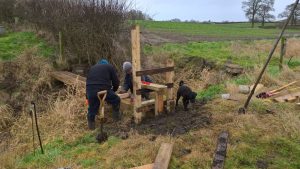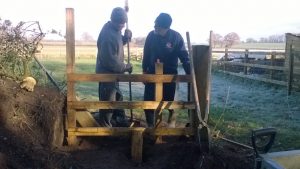Recent data from the National Association of Local Councils (NALC) has revealed that at least half of local parish and town councils utilise their discretionary powers to deliver some services to their communities.
Although it can be a daunting step for some, a number of parish councils are already ‘self-helping’ and getting involved in highways related activities in their areas, many through the management of volunteers or by collaborating with other parish councils.
Here are some great success stories:
The community payback team has been working in Norton Canes undertaking various clean-up tasks, including highways amenities tasks.
The parish council has been liaising with the Probation Service, who provided the team, for some time.
Tasks undertaken have included litter picking, clearing of pathways, garden areas and anything the team is asked to undertake.
A parish council spokesperson said: “This is free resource that provides us with the opportunity to work on the presentation of the village.
“They have recently undertaken a large project clearing the path on Lime Lane as this was becoming impassable for pedestrians and disabled motor scooters because of the overgrowth.”
Following the analysis of a parishioner survey, the Milwich Footpath Maintenance Group was founded by volunteers from within the Parish.
The small group of volunteers were encouraged to get involved in everything from clearance, signage, stile and gate repairs and works to install steps and in many cases the volunteers have used their own tools as well as some provided by the County Council.
Since inception the group has installed or replaced 39 stiles and repaired several others, installed or repaired 18 finger posts, installed or repaired six bridges, installed two gates and repaired another three, and installed numerous steps on steep banks as well as ongoing clearance and signage works. Path furniture is labelled on completion of the work which has led to the group receiving positive feedback and offers of help.
The group have also liaised with landowners and developed their own dog gate to install when new stiles were installed. They have raised money for these gates with grants and donations and now, whenever landowners permit, a dog gate is installed each time a stile is fitted. To date the group have installed 27 dog gates in the Milwich and Fradswell area.
For the last 20 years, the county council has provided training and funding for tools and  equipment to support the Parish Council to maintain path furniture (including the replacement of footbridges and stiles), signage and to clear vegetation. The Parish Council also actively promote their path network through the design and implementation of a number of promoted walks.
equipment to support the Parish Council to maintain path furniture (including the replacement of footbridges and stiles), signage and to clear vegetation. The Parish Council also actively promote their path network through the design and implementation of a number of promoted walks.
In the Eccleshall and west Staffordshire area the council also has a ramblers volunteer group – the Bishops Offley Volunteers – and this group works alongside the County Works Unit to undertake all types of path maintenance including some work in Eccleshall.
the Bishops Offley Volunteers – and this group works alongside the County Works Unit to undertake all types of path maintenance including some work in Eccleshall.
In 2016 Anslow Parish Council contacted the rights of way team to ask how they would be able to get involved in the maintenance of their local path network.
In 2017 the group has just begun work maintaining rights of way and, to date, they have undertaken over 70 hours of work to clear paths and repair path furniture
The group have also liaised with landowners, undertaken surveys and reported path problems to the county council
Whilst this group is in its infancy it is enthusiastic and keen to assist improving the path network in Anslow over the coming months.
A number of parish and town Councils are working together to deliver Lengthsman services. Three different arrangements have been established in North Nottingham by different groupings of parish and town Councils. This gives parish and town councils the opportunity to make a difference to the appearance of their local highways amenities by employing a local person or contracting a local company to carry out minor jobs within their community.
The parishes are involved because of improved satisfaction levels amongst residents and that recurring minor issues are being dealt with more efficiently.
This is delivered through different models, depending on the parish council:
- where one of the larger councils provide a full range of services for smaller councils
- A common clerk carried out the administration for a number of councils for the Lengthsman scheme – they already employed the services of two contractors and therefore added the additional duties onto this contract following appropriate training.
- A group of parishes (Sutton-cum-Lound, Lound and Mattersey) came together and set up a shared Lengthsman scheme using an external contractor after an appropriate procurement process. One of the councils lead the scheme (in this case the Clerk from Mattersey), and after receiving the schedule of works to be carried out from each council, created the invitation to tender and set up the scheme. The orders were then placed for the three councils by the lead council. The individual councils monitored work and when complete reported back to the lead council.
Kinver Parish Council has employed two a handymen for a number of years and they have been involved in all types of maintenance work throughout the parish including work on the rights of way network.
In the late 1990’s the parish council wanted to improve the condition of their local rights of way network and encouraged local people to work alongside their handymen to help with its maintenance. The parish council founded its own Footpath Committee to focus on rights of way issues and this helped get the voluntary offer up and running.
The volunteers received training and some tools from Staffordshire County Council and began undertaking a variety of works on the path network.
Over time the amount of volunteers involved grew and the parish became very proactive in the management of their local paths. They agreed to take delivery of some stock – stiles, fingerposts, gates, etc. – and stored these in their small stock yard.
The parish recognised the importance of liaising with the county council to ensure there was no duplication of work and so that landowners were fully informed before the volunteers entered their land to undertake works.
The parish council also actively promote their path network through the design and implementation of a number of promoted walks.
Dulverton Town Council has joined with ten parish councils to provide lengthsman services. Now in operation for three years, funding is provided by each of the ten parish councils to maintain the scheme. While the costs of employing a lengthsman would be prohibitive for individual parish councils, by working together, the scheme allows each council to provide a much needed service for their community.
Five parishes in south Shropshire share two lengthsmen, who undertake duties such as grass strimming, drain clearing and traffic sign cleaning.
They are local residents with a detailed knowledge of every road, ditch, drain and stream. In particular, they know those most liable to flood during heavy rain and deal with them whenever the need occurs.
They also look out for major maintenance needs, which – while beyond their remit – they report to the highways department at the local authority. Since the service has been locally managed, the local environment has improved, flooding has reduced and resident satisfaction has increased.
The National Association for Local Councils has given SCC permission to use this case study from ‘Taking on a providing local services – An advisory note for smaller local councils’’ – National Association for Local Council, January 2011
How you could go about it
Now that you’ve been inspired, consider what your parish council could do by:
- Considering the range of ‘big picture options’ options – from doing nothing to getting funding to help with rights of way and small highways tasks
- Considering a summary of possible highways and rights of way tasks and what do you need to consider
- Consider the detail of what’s involved in each task:
Drainage
Footways and verges
Street furniture
Vegetation
Winter- gritting pathways
Maintaining gaps in Rights of Way
Maintaining stiles in Rights of Way
Maintaining gates in Rights of Way
Maintaining signage on Rights of Way
Contact us to explore your options – because it’s clear that different parish councils are funding different ways to manage small highways amenities, and that no one size fits all.